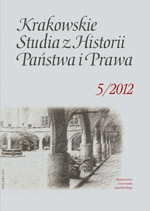Beneficjenci indywidualnych zwolnień podatkowych w miastach w dobie jagiellońskiej
The Beneficiaries Of Individual Tax Exemptions As Detectable In The Royal Towns Of Polonia Minora Of The Jagiellonian Era
Author(s): Maciej MikułaSubject(s): Law, Constitution, Jurisprudence
Published by: Wydawnictwo Uniwersytetu Jagiellońskiego
Keywords: prvilege; taxes; Jagiellons; municipal law; libertation; sources edition; royal documents
Summary/Abstract: While exercising the state power, the Jagiellons instrumentally exploited the privileges granted to social groups or individuals. The privileges created a new legal state different from that secured by the Polish ius commune. The beneficiaries of the privileges were not only the royal and private towns but also the specific individuals. The latter were frequently the nobles or clergy as well as ecclesiastical institutions. In the towns the liberty-introducing privileges, issued for the possessors of landplots in the town, were detrimental not only to the royal but also to the municipal treasury. In addition these privileges were frequently bound with the court exemption. This meant that the dispute referring to the piece of land was subject to the competence of nobiliary or ecclesiastical courts. From the 15th century on, the royal towns used to obtain the assurance of the King who promised that he would refrain from issuing tax liberties for the benefit of individuals. But since the king excercised the power of issuing leges speciales he was not bound by promises he made. The policy pursued by the Jagiellons vis-a-vis the towns was the resultant of the policy that the kings pursued at home. This policy required efforts designed to construe and maintain political groupings. The royal towns, as a part of royal demesne, were the assets which were expected not so much to bring a pure income to the treasury but were instrumentally exploited for the governing of the country. They were considered to be the tool suitable for rewarding the loyal individuals. The issuing of tax exemption was therefore one of the instruments facilitating the government business. This instrument was obviously of smaller potence then ius distributiva, pledging royal demense, headships of villages as well as legacies on salt mines and customs. Nevertheless, this was the instrument worth noting. It was something what was not ignored either by chancellors or castellans.
Journal: Krakowskie Studia z Historii Państwa i Prawa
- Issue Year: 5/2012
- Issue No: 1
- Page Range: 13-25
- Page Count: 13
- Language: Polish

